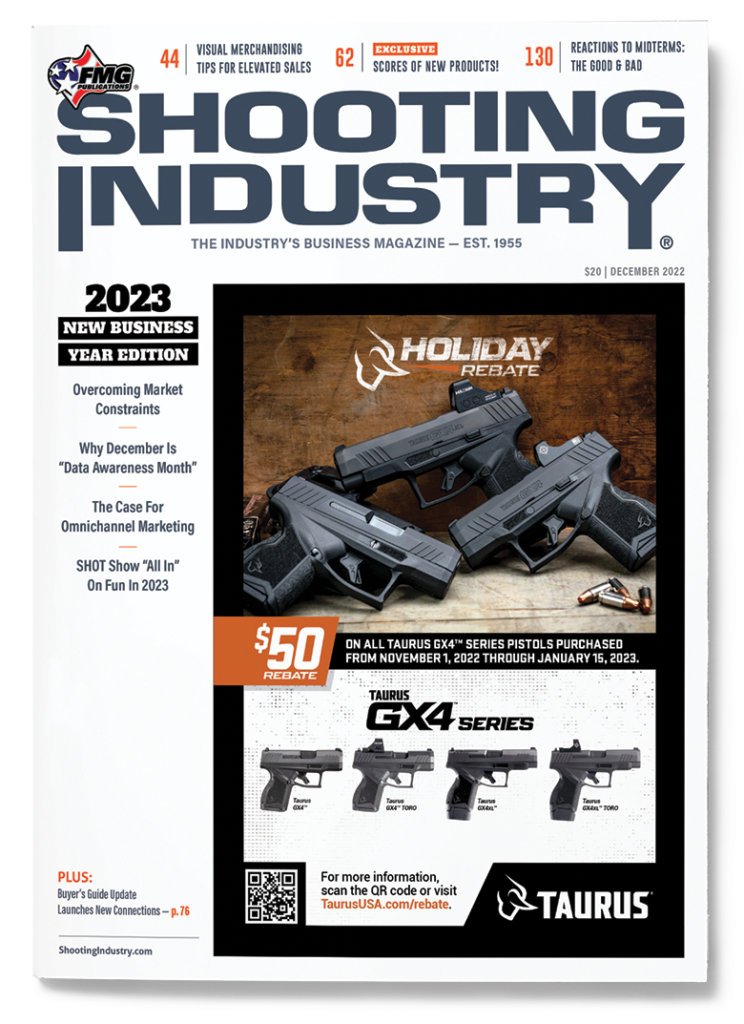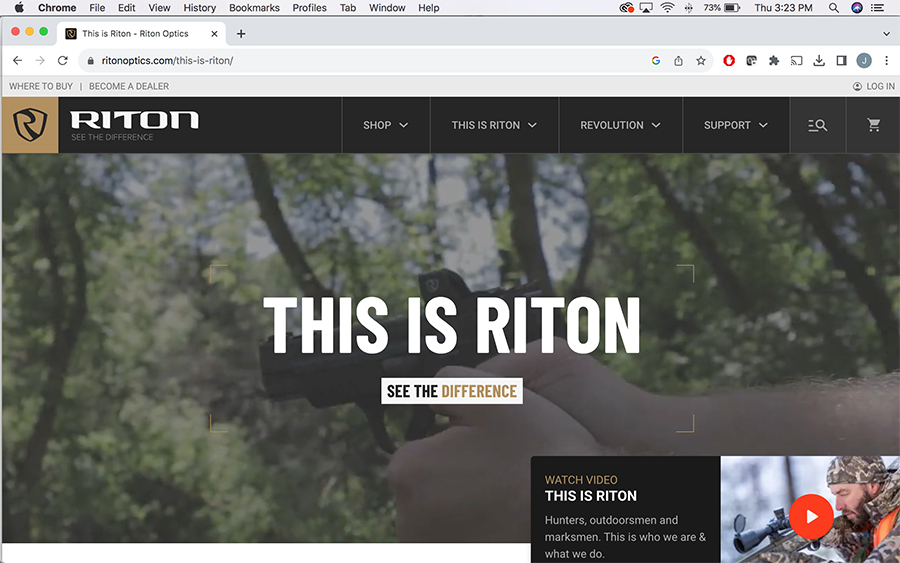Home-Based Dealers Speak Out
Whether they’re labeled as “kitchen-table dealers,” “basement bandits,” “garage shops” or “pariahs” — home-based FFL dealers have been at the center of one of the more dominant (and certainly controversial) talking points this year in Shooting Industry.
Matthew Sims, owner of Red Roo Defense, a home-based business operating out of Gray, Ga., got the ball rolling in the Jan. 2022 issue, asking: “Does our money not spend as well, or is it just because the wholesalers are afraid we’re going to make too much money by not having enough overhead? Or is it simply collusion — the brick-and-mortar dealers just don’t want the competition and have managed to convince the distributors we’re not worthy of their business?”
Sims’ inquiry has garnered dozens of emails from other home-based FFL holders, as well as storefront dealers. We’ve received everything from one-liners to formal, 1,000-word essays from dealers (sometimes more than once) expressing frustration at the industry’s status quo.
It’s clear this topic has resonated with readers — here are three notable talking points from this year’s discussion.
1. “We Are Helping The Industry.”
Frequently, one of the advantages an independent, storefront dealer has over a big-box competitor is the ability to provide more personalized service to the customer — whether it’s a more knowledgeable staff or having the ability to spend additional one-on-one time walking a customer through a purchase. In the same vein, home-based retailers can tout having an edge with even more personalized service thanks to a smaller customer pool.
Jeff Wood, operations manager at Xcalibur Arms in Meadow, Utah, highlighted this advantage and how it makes the industry safer.
“Us small ‘mom and pop’ shops provide personal one-on-one service, and most all of our customers are repeat customers,” he said. “We provide a level of personalization the bigger shops do not. On top of that, we don’t sell to just anyone. We’re more selective on who we sell to, which makes the industry more safe!”
Dissatisfied with the service he was receiving from his local gun store, Benjamin TenWolde and two friends opened Nango Arms in Norwich, N.Y.
“We got into this business partly because our local shop thought that they could do business the same way for 50 years with no competition for miles,” he said. “As a customer I saw a need for change frustrating enough to consider being a part of that change.”
Robert Hood of Robert’s Gunsmithing Inc. in Redmond, Ore., contended while smaller FFLs can spend more time with customers, he didn’t have a problem with the current pricing structure.
“I’d say the ‘garage shops’ have more time to talk with people about what they’re looking for,” he said. “Do, I think we home-based guys should get the same deal? It’s an emphatic ‘no.’ However, we should get something. I have often referred my customers to a brick-and-mortar store because the deal would be better there. And by the way, we are helping the industry. Everyone involved is helping the industry.”
Likely similar to the motivation of a storefront dealer, some home-based dealers shared their motivation for opening came from their passion of the shooting sports.
“Not every home-based FFL dealer is out to corner the market,” said Dan Geil, owner of Blue Heart Training in Hartford, Ill. “I’m not saying some wouldn’t try, but the small dealers I’ve dealt with do it for the love of firearms in general and provide services bigger dealers don’t (or won’t). Thanks for listening to another pariah.”
2. Big-Boxes Are The Problem!
Home-based FFLs have lamented how big-box retail stores get opportunities and pricing other businesses, quite simply, can’t compete with.
“Big-box stores being at the heart of this debate worry about volume, not the customer or the community,” contended Justin Scheffler, owner of Scheffler’s Straight Shooters in Crooksville, Ohio. “Between the stores and websites they run, big-boxes can offer products at excessively low prices. As long as people buy from them rather than local for ammunition and all the other small stuff to save a trip or $0.03 per round, they’re effectively taking the buying power from the local guys and giving it to the opposition.”
“I realize there are good dealer reps and bad dealer reps. I’ve had my share of both,” said Dave Apel of New Freedom Enterprises in Moberly, Mo. “I once had a dealer rep call me, not my usual one, and he said he had a big-box store back out of a large order. He offered to sell me those firearms at the same price the big-box would have — it amounted to around $100 less per firearm than my price. So, not only do the big stores get first dibs, they also get cheaper prices than smaller stores.”
Walter Ward, owner of Wild Way Guns in Soldotna, Ala., operated as a storefront dealer for more than 30 years before deciding to close his doors after “giving up” due to complications trying to transfer his FFL from a commercial address to his residence. He cast blame for diminishing firearm margins on big-box retailers.
“In my opinion, the manufacturers and distributors who allow/encourage the big-box stores to sell their firearms for 10–15% margins over wholesale are the real culprits! These big-box stores are the ones who have run the retail prices of firearms down to these pathetic margins, not the small stores and home-based FFL dealers,” he said.
Raquel Stephenson, owner of Squad 7 Firearms & Sporting Goods in Longmont, Colo., had questions for storefront dealers, as well as distributors.
“To the brick-and-mortars out there: why the reluctancy to a competitive business? Isn’t that what a free market is about? If you can’t compete with a home-based, how do you compete with big-box or other sellers selling at pennies over cost? (Assuming your cost is the same as mine,)” she noted. “But the greater question would be for the distributor and their reason for not supplying a home-based business. A sale is a sale, correct?”
“The fact I’m different or lower-volume doesn’t make me any less worthy of the same opportunities to do business. I spend the exact same U.S. dollar, don’t I?”
James Sagstetter, Owner
Detroit Armament, St. Clair, Mich.
3. Aren't We All On The Same Team?
Nearly every email I’ve received from a home-based FFL on this topic expressed surprise at the opposition they’ve faced from our own industry.
“Too much of ‘our’ industry is rooted in an ‘us versus them’ mentality — fighting over a narrow slice of pie when we should work together to grow a bigger pie so we can all take a larger slice,” said Steve Smith, who asked to keep his store name private.
“Being a small home-based gunsmith, I have followed this debate. Thirty-some years ago when I became an FFL, virtually all distributors where happy to have your business —no matter how small. Now, profit outweighs passion. Volume outweighs service. Sales outweighs friendship. This is the direction of the industry regardless of the ‘feel good’ articles and interviews,” said Kevin Silha, owner of K&S Arms in La Crosse, Wis.
“We live in New York. I envisioned every state and local authority I worked with would be trying to keep us down. In reality, the strongest headwinds we have encountered to our success have come from within the industry,” added TenWolde of Nango Arms.
James Sagstetter, owner of Detroit Armament in St. Clair Shores, Mich., has been in business for two-and-half-years. While he understands wholesalers can’t universally sell to every home-based FFL, stores like his are losing out on opportunities because they’re cataloged the same way.
“The fact I’m different or lower-volume doesn’t make me any less worthy of the same opportunities to do business. I spend the exact same U.S. dollar, don’t I? There is demand for the business model I operate,” he said. “My company is no less a business than any other FFL, and I believe my business is no less worthy of the same opportunities to do business than any brick-and-mortar storefront.”
Concluding Thoughts
Sims, who kickstarted this topic earlier this year, provided his assessment after tracking our coverage.
“While following the story I was saddened to see some dealers’ negative opinions about those of us who are home-based. I wouldn’t be surprised if the employees within those storefronts are the kind of ‘know-it-alls’ that partially inspired me to start my own business in the first place,” he said. “As for me, I know I’m never going to be a large-scale, high-volume dealer. Instead, I’ll continue to try to give my customers the personal service they deserve. I have an awful lot of repeat customers and to me, that says it all.”
While Shooting Industry will continue to serve storefront dealers first, we acknowledge the ways of doing business have evolved — especially in the last couple years. Online businesses are here to stay, and we’ve been in contact with a number of them who have the same goals as their storefront counterparts: to serve customers and expand the shooting sports to a broader spectrum of enthusiasts.
There’s no perfect solution, but we’re going to continue reporting on this in 2023 and are seeking input from wholesalers, as well. Stay tuned.
Have a comment to add to this hot-button issue? We invite your feedback, feel free
to contact the SI team anytime: comments@shootingindustry.com.





